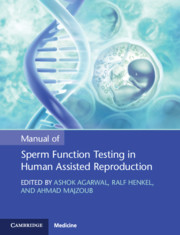Book contents
- Manual of Sperm Function Testing in Human Assisted Reproduction
- Cambridge Laboratory Manuals in Assisted Reproductive Technology
- Manual of Sperm Function Testing in Human Assisted Reproduction
- Copyright page
- Dedication
- Contents
- Contributors
- Short Biography
- Foreword
- Preface
- Introduction
- Chapter 1 Standard Semen Examination: Manual Semen Analysis
- Chapter 2 Standard Semen Analysis: Computer-Assisted Semen Analysis
- Chapter 3 Standard Semen Analysis: Home Sperm Testing
- Chapter 4 Standard Semen Analysis: Leukocytospermia
- Chapter 5 Standard Semen Analysis: Morphology
- Chapter 6 Sperm Vitality: Eosin-Nigrosin Dye Exclusion
- Chapter 7 Sperm Vitality: Hypo-Osmotic Swelling Test
- Chapter 8 Determination of Mitochondrial Membrane Potential by Flow Cytometry in Human Sperm Cells
- Chapter 9 Capacitation and Acrosome Reaction: Fluorescence Techniques to Determine Acrosome Reaction
- Chapter 10 Capacitation and Acrosome Reaction: Histochemical Techniques to Determine Acrosome Reaction
- Chapter 11 Zona Binding: Competitive Sperm-Binding Assay
- Chapter 12 Zona Binding: Hemizona Assay
- Chapter 13 Oolemma Binding: Sperm Penetration Assay
- Chapter 14 Oxidative Stress Testing: Direct Tests
- Chapter 15 Oxidative Stress Testing: Indirect Tests
- Chapter 16 Chromatin Condensation: Aniline Blue Stain
- Chapter 17 Chromatin Condensation: Chromomycin A3 (CMA3) Stain
- Chapter 18 Sperm Chromatin Structure: Toluidine Blue Staining
- Chapter 19 DNA Damage: TdT-Mediated dUTP Nick-End-Labelling Assay
- Chapter 20 DNA Damage: Sperm Chromatin Structure Assay
- Chapter 21 DNA Damage: COMET Assay
- Chapter 22 DNA Damage: Halo Sperm Test
- Chapter 23 DNA Damage: Fluorescent In-Situ Hybridization
- Chapter 24 Clinical Value of Sperm Function Tests
- Chapter 25 Future Developments: Sperm Proteomics
- Conclusion
- Index
- References
Chapter 16 - Chromatin Condensation: Aniline Blue Stain
Published online by Cambridge University Press: 05 April 2021
- Manual of Sperm Function Testing in Human Assisted Reproduction
- Cambridge Laboratory Manuals in Assisted Reproductive Technology
- Manual of Sperm Function Testing in Human Assisted Reproduction
- Copyright page
- Dedication
- Contents
- Contributors
- Short Biography
- Foreword
- Preface
- Introduction
- Chapter 1 Standard Semen Examination: Manual Semen Analysis
- Chapter 2 Standard Semen Analysis: Computer-Assisted Semen Analysis
- Chapter 3 Standard Semen Analysis: Home Sperm Testing
- Chapter 4 Standard Semen Analysis: Leukocytospermia
- Chapter 5 Standard Semen Analysis: Morphology
- Chapter 6 Sperm Vitality: Eosin-Nigrosin Dye Exclusion
- Chapter 7 Sperm Vitality: Hypo-Osmotic Swelling Test
- Chapter 8 Determination of Mitochondrial Membrane Potential by Flow Cytometry in Human Sperm Cells
- Chapter 9 Capacitation and Acrosome Reaction: Fluorescence Techniques to Determine Acrosome Reaction
- Chapter 10 Capacitation and Acrosome Reaction: Histochemical Techniques to Determine Acrosome Reaction
- Chapter 11 Zona Binding: Competitive Sperm-Binding Assay
- Chapter 12 Zona Binding: Hemizona Assay
- Chapter 13 Oolemma Binding: Sperm Penetration Assay
- Chapter 14 Oxidative Stress Testing: Direct Tests
- Chapter 15 Oxidative Stress Testing: Indirect Tests
- Chapter 16 Chromatin Condensation: Aniline Blue Stain
- Chapter 17 Chromatin Condensation: Chromomycin A3 (CMA3) Stain
- Chapter 18 Sperm Chromatin Structure: Toluidine Blue Staining
- Chapter 19 DNA Damage: TdT-Mediated dUTP Nick-End-Labelling Assay
- Chapter 20 DNA Damage: Sperm Chromatin Structure Assay
- Chapter 21 DNA Damage: COMET Assay
- Chapter 22 DNA Damage: Halo Sperm Test
- Chapter 23 DNA Damage: Fluorescent In-Situ Hybridization
- Chapter 24 Clinical Value of Sperm Function Tests
- Chapter 25 Future Developments: Sperm Proteomics
- Conclusion
- Index
- References
Summary
Spermatozoa, one of the two most pivotal cells of biological existence, are responsible for mediating the transfer of genetic information to subsequent generations. Mammalian fertilization and subsequent embryonic development depend in part on the inherent integrity of sperm genome. Different fertility societies around the globe and the World Health Organization (WHO) estimate that infertility is present in between 7 and 15 percent of couples of reproductive age [1].
- Type
- Chapter
- Information
- Manual of Sperm Function Testing in Human Assisted Reproduction , pp. 142 - 150Publisher: Cambridge University PressPrint publication year: 2021



